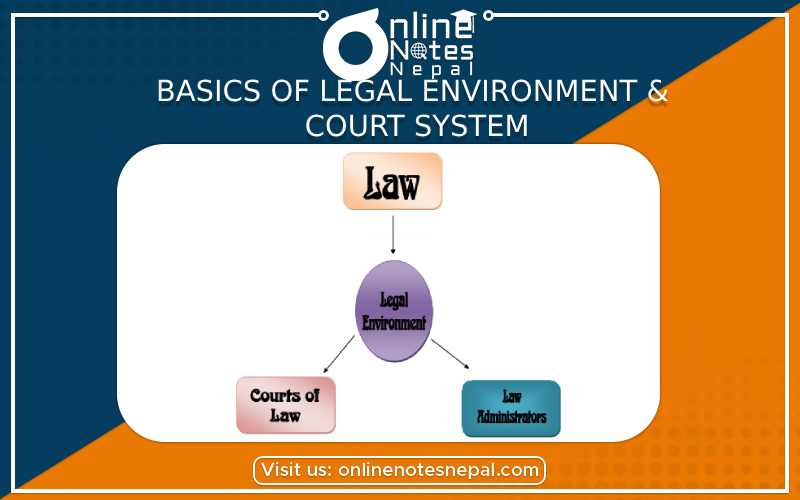The legal environment and court system are important components of any society because they provide a framework for resolving conflicts, protecting the rule of law, and ensuring justice is delivered. Individuals, corporations, and governments must all understand the fundamentals of the legal environment and court system.
Let's look at some crucial ideas:
Legal Environment:
The comprehensive structure of laws, regulations, and legal institutions that control and affect interactions between individuals, organizations, and the government is referred to as the legal environment. It establishes the rules of behaviour and ensures the protection of people's rights.
Sources of Law:
The legal environment is formed by a variety of sources of law, which include:
- Constitutional Law: A country's highest form of law, generally establishing the organization of government, individual rights, and the relationship between the government and its population.
- Statutory Law: Laws passed by legislatures to handle specific concerns or regulate various parts of society, such as federal, state, or local laws.
- Legal concepts and doctrines arising from court decisions and precedents rather than statutes are referred to as common law.
- Administrative law refers to the rules and regulations developed by administrative agencies to interpret and implement statute law.
- International law is the set of rules and principles that regulate international relations.
Court Sysytem
The judicial system is the institutional structure in charge of interpreting and administering the law in order to resolve disputes and give justice. It usually comprises of numerous tiers of courts, each with its own set of rules.
- Trial Courts: These are the principal courts where legal cases begin. They are also known as district or county courts. They hold trials, hear evidence, and use the law to establish facts and make decisions.
- Appellate Courts: These courts review trial court decisions to ensure that they were made accurately and in compliance with the law. They do not convene new trials, but instead analyze legal arguments and the lower court's record.
- Supreme Court (or Highest Court): The highest level of a country's or jurisdiction's court system. It is authorized to hear appeals from lower appellate courts and, in some situations, to exercise original jurisdiction over specified matters.
Criminal vs. Civil Law:
- Civil law is concerned with disagreements between persons or organizations. The goal is to compensate the harmed party and return them to their original status before to the harm.
- Criminal law refers to actions that are deemed crimes against society. Individuals suspected of committing crimes are prosecuted by the state, and the emphasis is on punishment.
The Adversarial System vs. the Inquisitorial System:
- Adversarial System: This system, which is widespread in nations with common law traditions, lays the burden of presenting evidence and arguments on the opposing parties, with a neutral judge presiding over the case.
- The inquisitorial system, which is more common in civil law countries, gives the judge a more active role in investigating the case and acquiring evidence, typically with the assistance of court-appointed specialists.
Due Procedure:
Due process assures that people have the right to a fair and unbiased hearing before the law and that they cannot be deprived of their life, liberty, or property without following established legal procedures.
Jurisdiction:
The authority of a court to hear and determine a case is referred to as jurisdiction. It can be determined by geography, subject content, or the parties involved.
Appeals:
Parties that are dissatisfied with a lower court's ruling may appeal to a higher court, which will evaluate the case and determine if errors in the application of the law occurred.
These fundamentals lay the groundwork for comprehending the legal environment and court system. However, it is crucial to realize that legal systems differ greatly between countries, and each jurisdiction may have its own set of rules.
